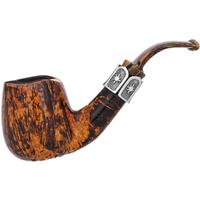WWII and Tobacco Pipe Smoking
- Thread starter kashmir
- Start date
You are using an out of date browser. It may not display this or other websites correctly.
You should upgrade or use an alternative browser.
You should upgrade or use an alternative browser.
- Status
- Not open for further replies.
Great photos! I love seeing photos and film of this era, as well as movies based upon this time. Currently I've been watching Winds of War on Netflix. It's a pretty descent miniseries with quite a bit of pipe smoking going on.
Someone I know who served in the Canadian military no too long ago was saying you can only smoke a pipe or chew because the cigarette cherry's will give your location away.
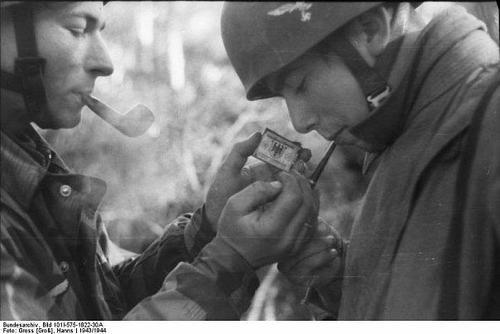



http://www.youtube.com/watch?v=FrHkKXFRbCI#t=162
:

There's a pretty amazing story behind that photograph.
The man seated is Alfred's son, Alfred Henry, amid the rubble of his shop, selling his wares.
Talk about British resolve - keeping calm and carrying on was of utmost importance in the midst of such utter disaster,
the spirit shan't be broken.
This image shows what Jermyn Street looked like on April 17 1941,
and Alfred H. kept calm and carried on...

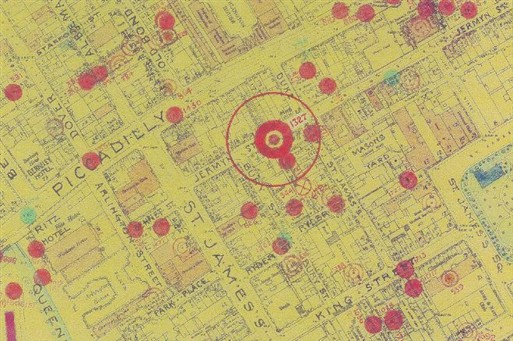
This page gives a map of exactly where that High Explosive Bomb fell:
http://dev.bombsight.org/bombs/14244/
...the whole site is interesting to go through.
The following passage is taken from the Balfour book Alfred Dunhill: One Hundred Years And More
"...after a lull of many weeks German air raids on London were resumed on 19 March 1941, with increased intensity.
Early in the evening of Wed. 16 April, the bombs began to fall, by 2:30 AM on the morn of 17 April they were falling at roughly 20-second intervals. It was the heaviest raid on London since the war began.
At about 3 o'clock that morning two land mines, each weighing about a ton and suspended from parachutes of green silk, hit the Alfred Dunhill shop and destroyed most of it. The Jermyn Street shop area was completely destroyed, but part of the old Duke Street premises survived the blast. Most of the stocks and all of the museum were lost, but the shop cat survived.
In some 3 feet of water and half-darkness, staff members rescued what stocks and mail order records they could. William Phipps, the shop manager, toiled manfully in his smock and bowler hat. Budd the windowdresser arrived just as sparks from a fire raging in the Hammam Baths opposite the Jermyn Street entrance, fell on the shop and started a fire causing further damage. Rescued stocks and records were taken over to the H.L. Savory shop at 178 New Bond Street."
More info here:
http://www.westendatwar.org.uk/page_id__236_path__0p28p.aspx


:
Teddy said:
"I like the picture were the man is selling Dunhills"

There's a pretty amazing story behind that photograph.
The man seated is Alfred's son, Alfred Henry, amid the rubble of his shop, selling his wares.
Talk about British resolve - keeping calm and carrying on was of utmost importance in the midst of such utter disaster,
the spirit shan't be broken.
This image shows what Jermyn Street looked like on April 17 1941,
and Alfred H. kept calm and carried on...


This page gives a map of exactly where that High Explosive Bomb fell:
http://dev.bombsight.org/bombs/14244/
...the whole site is interesting to go through.
The following passage is taken from the Balfour book Alfred Dunhill: One Hundred Years And More
"...after a lull of many weeks German air raids on London were resumed on 19 March 1941, with increased intensity.
Early in the evening of Wed. 16 April, the bombs began to fall, by 2:30 AM on the morn of 17 April they were falling at roughly 20-second intervals. It was the heaviest raid on London since the war began.
At about 3 o'clock that morning two land mines, each weighing about a ton and suspended from parachutes of green silk, hit the Alfred Dunhill shop and destroyed most of it. The Jermyn Street shop area was completely destroyed, but part of the old Duke Street premises survived the blast. Most of the stocks and all of the museum were lost, but the shop cat survived.
In some 3 feet of water and half-darkness, staff members rescued what stocks and mail order records they could. William Phipps, the shop manager, toiled manfully in his smock and bowler hat. Budd the windowdresser arrived just as sparks from a fire raging in the Hammam Baths opposite the Jermyn Street entrance, fell on the shop and started a fire causing further damage. Rescued stocks and records were taken over to the H.L. Savory shop at 178 New Bond Street."
More info here:
http://www.westendatwar.org.uk/page_id__236_path__0p28p.aspx
____________________________________________
We shape our buildings, and afterwards our buildings shape us.
These cruel, wanton, indiscriminate bombings of London are, of course, a part of Hitler’s invasion plans. He hopes, by killing large numbers of civilians, and women and children, that he will terrorise and cow the people of this mighty imperial city ... Little does he know the spirit of the British nation, or the tough fibre of the Londoners.
We have not journeyed all this way across the centuries, across the oceans, across the mountains, across the prairies, because we are made of sugar candy.
Upon this battle depends the survival of Christian civilisation. Upon it depends our own British life and the long continuity of our institutions and our Empire. The whole fury and might of the enemy must very soon be turned on us now. Hitler knows that he will have to break us in this island or lose the war. If we can stand up to him, all Europe may be free and the life of the world may move forward into broad, sunlit uplands. But if we fail, then the whole world, including the United States, including all that we have known and cared for, will sink into the abyss of a new Dark Age, made more sinister, and perhaps more protracted, by the lights of perverted science. Let us therefore brace ourselves to our duties, and so bear ourselves that, if the British Empire and its Commonwealth last for a thousand years, men will still say, 'This was their finest hour.'
Winston Churchill
_________________


Arno, on his great blog, also adds to the story,
"...Alfred Dunhill’s store, and many other in the surrounding area, was bombed and destroyed. A popular tale tells that when that happened, Dunhill employees called Sir Winston Churchill at four o’ clock in the night. This to assure him his private collection of cigars (which were kept in the store’s humidor) had already been relocated to safety. And with that attitude Dunhill continued to sell pipes from the debris and ruins of the store."
http://dutchpipesmoker.wordpress.com/tag/woii/
:
"...Alfred Dunhill’s store, and many other in the surrounding area, was bombed and destroyed. A popular tale tells that when that happened, Dunhill employees called Sir Winston Churchill at four o’ clock in the night. This to assure him his private collection of cigars (which were kept in the store’s humidor) had already been relocated to safety. And with that attitude Dunhill continued to sell pipes from the debris and ruins of the store."
http://dutchpipesmoker.wordpress.com/tag/woii/
:
Talking about Douglas Bader.. Look at the pipe he smokes in the picture a couple of posts above. I once had an e-mail conversation with a British pipe collector, well, Dunhill collector:
On a final note - for now anyway - the other attached pics I thought may be of interest to you given your passion for the old and rare...It's of my pride and joy that first began my obsession with Dunhill - an undated patent number Bruyere from 1941 that has had only light smoking and which came in its original box, with purchase receipt, several spare packs of inner tubes (some still sealed), pipe cleaners and an interesting provenance….it was gifted to me and I have therefore no more to go on but the word of the very generous person who gave the pipe to me…but who nevertheless advised me that it was once the property of one rather famous spitfire pilot - Douglas Bader - who bought it in London himself whilst on one of his many trips to the air ministry during the Battle of Britain. Who knows….but it's a great thought to have in your head as you smoke it!!! (Tally Ho…chocks away…)
And this is that pipe:
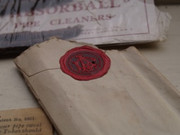
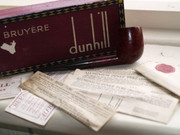
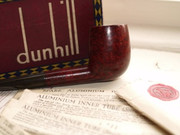
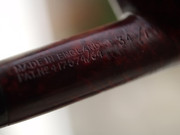
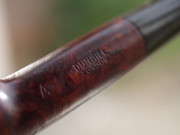
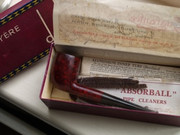
On a final note - for now anyway - the other attached pics I thought may be of interest to you given your passion for the old and rare...It's of my pride and joy that first began my obsession with Dunhill - an undated patent number Bruyere from 1941 that has had only light smoking and which came in its original box, with purchase receipt, several spare packs of inner tubes (some still sealed), pipe cleaners and an interesting provenance….it was gifted to me and I have therefore no more to go on but the word of the very generous person who gave the pipe to me…but who nevertheless advised me that it was once the property of one rather famous spitfire pilot - Douglas Bader - who bought it in London himself whilst on one of his many trips to the air ministry during the Battle of Britain. Who knows….but it's a great thought to have in your head as you smoke it!!! (Tally Ho…chocks away…)
And this is that pipe:






Great pics! Fascinating glimpses into history! I'm sure the pipe offered one of the few simple pleasures that the soldiers on both sides could enjoy despite the sufferings and horrors that they were forced to endure daily throughout the war. The pic of the pipe recovered from the German tank in 2008 is really neat. Amazing how well preserved it was after being submerged for over 50 years!
jazz ... thanks for digging this up ... I somehow missed it when it was current and am glad to have seen it ...
Fascinating stuff. My Dad tells fond stores about the war years in Britain, he was young, would have been in Junior school and moved away from the city he was living in to live in the country side for safety. His favorite story was the time he was at school, watching dog fights overhead between Spitfires and Me 109's. A 109 was shot down and crashed landed hear his school. A school full of kids went to the crash site and as he puts it "captured" the dazed but uninjured pilot before the police and Army arrived.
He would often tell stories of the German POW's who would work mending roads, buildings etc. They would carve gifts for the kids from wood, make toys and give them away. They were I'm sure missing their own children so that was important to them. Dad has never spoke unkindly about them, they didn't try to escape, they just wanted to go home when the war was over.
He would often tell stories of the German POW's who would work mending roads, buildings etc. They would carve gifts for the kids from wood, make toys and give them away. They were I'm sure missing their own children so that was important to them. Dad has never spoke unkindly about them, they didn't try to escape, they just wanted to go home when the war was over.
I really enjoyed looking through these pictures.
Not long ago, I visited the USS Alabama, a decommissioned battleship not far away. They had a few officers' rooms on display done up with accurate period artifacts, including several pipes. As above, mostly billiards, but I have no idea who picked them out. Tobacco was available at the ship's store, though I never found out what kinds. I'm guessing it was a pretty limited selection.
Not long ago, I visited the USS Alabama, a decommissioned battleship not far away. They had a few officers' rooms on display done up with accurate period artifacts, including several pipes. As above, mostly billiards, but I have no idea who picked them out. Tobacco was available at the ship's store, though I never found out what kinds. I'm guessing it was a pretty limited selection.
- Status
- Not open for further replies.



